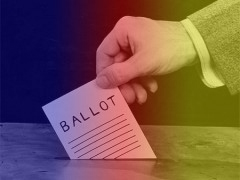 See a more recent post on this topic here
See a more recent post on this topic here
One of the enduring images of the 2010 General Election will be of long queues of people turned away from polling stations due to lack of facilities. This may well result in legal action. But according to Lord Pannick, the worse scandal may be the exclusion of 85,000 prisoners, which he says is “a constitutional disgrace that undermines the legitimacy of the democratic process”.
The BBC reports this morning that hundreds of voters were turned away from polling stations throughout the UK. This was initially blamed on a higher than expected turnout. The Electoral Commission has promised a “thorough review“, but legal action may follow from the individuals, who have been denied their basic rights, but also from the parties who may argue that marginal results would have been different if people hadn’t been turned away. In the likely outcome of a hung parliament, every seat counts and litigation may therefore follow (Update – Afua Hirch in The Guardian: Legal challenge to polling stations could result in byelections; meanwhile, Liberty, the human rights organisation, says that it will investigate the issue on behalf of voters.)
Those who have been disenfranchised may be entitled to claim under the Human Rights Act 1998. Article 1, Protocol 3 of the European Convention provides:
“The High Contracting Parties shall hold free elections at reasonable intervals by secret ballot, under conditions which will ensure the free expression of the opinion of the people in the choice of the legislature.”
This Article imposes obligations on States, and the provision includes the right to vote. Voters should be able to claim for damages under section 8 of the Human Rights Act if they can prove that they were denied a vote due to administrative incompetence, which appears to have been the case in some places. Whilst high turnout may have been a factor, voters will argue that high turnout has been predicted for a while, and should have been planned for. Similar claims were made in respect of the controversial 2000 presidential election in the United States, which was ultimately decided by the US Supreme Court, but resulted in months of paralysis.
85,000 claims?
Whilst a few hundred appear to have been affected by administrative incompetence, Lord Pannick, barrister and cross-bench peer, argues that the absolute ban on prisoners voting runs contrary to repeated decisions of the European Court of Human Rights. We have posted recently on the tens of thousands of potential compensation claims that may result, which Lord Pannick estimates will be worth at least £750 each. Similar claims may be available to those who were denied the vote for other reasons.
Lord Pannick is scathing of the Government’s failure to implement the European decisions. He says:
Continue reading →
 Updated, Tue 21 Sep | It is being reported that Nick Clegg, the deputy prime minister, is looking to end the ban on prisoners voting in elections. If the law were to change, it would represent the end of a very long road for campaigners. However, they have been waiting since 2005 and may well be waiting for longer yet.
Updated, Tue 21 Sep | It is being reported that Nick Clegg, the deputy prime minister, is looking to end the ban on prisoners voting in elections. If the law were to change, it would represent the end of a very long road for campaigners. However, they have been waiting since 2005 and may well be waiting for longer yet. 








